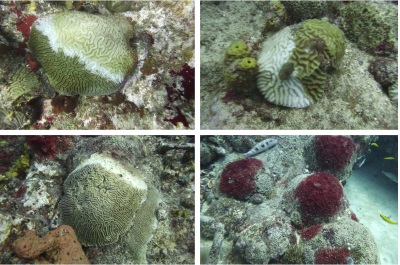 PHILIPSBURG:---The Nature Foundation has been monitoring the impact of the Stony Coral Tissue Loss Disease on St Maarten coral reefs since it was first discovered in October 2018. Recent a more elaborate research from the Nature Foundation established on average a 60% infection and mortality rate of the most susceptible stony corals in the Marine Park ‘Man of War Shoal’. On coral reefs outside the Marine Protected Area, an even higher average is found; at least 70% of the affect corals species are either diseased or dead.
PHILIPSBURG:---The Nature Foundation has been monitoring the impact of the Stony Coral Tissue Loss Disease on St Maarten coral reefs since it was first discovered in October 2018. Recent a more elaborate research from the Nature Foundation established on average a 60% infection and mortality rate of the most susceptible stony corals in the Marine Park ‘Man of War Shoal’. On coral reefs outside the Marine Protected Area, an even higher average is found; at least 70% of the affect corals species are either diseased or dead.
The Nature Foundation used the Roving Diver methodology I order to establish the impact of the Tissue Loss disease on our coral reefs. During the research scientific divers conduct a swim around the site, focusing on species that are primarily impacted by the disease outbreak, and all stony coral species and their level of disease impact are being recorded. This research provides insight in the order in which species are affected, the rate of spread of the disease and the frequency across different coral reef site.
“We found a 90% infection and mortality rate on one site outside the marine protected area, indicating that our coral reefs are dying as researchers did not observe any recovery from this disease yet. It is time to panic about the health of our reefs, as coral reefs are of great importance to our tourist industry, the health of our fish stocks, clarity of our waters and the protection from storms. There is some hope left, as we found greater resilience on our most famous dive site ‘Proselyte Reef’, ‘only’ less than 50% of the corals were diseased or dead on this site. The results of the coral disease research also shows the significance of protecting our reefs, as corals in the Marine Protected Area had lower mortality and infection rates compared to corals outside the protected area, indicating their higher resilience” explained Nature Foundation’s Projects and Research Officer Melanie Meijer zu Schlochtern.
The entire country benefits from an increase in Marine Protected Areas, as it creates more resilient reefs and corals, protecting our tourist industry and protecting us from disaster events, such as Hurricane Irma. Coral reefs provide more than fifty million dollars in goods and services to our economy annually, tourist come to our island to enjoy our beautiful beaches and coral reefs. Besides, healthy fish stocks depend on the health of our corals and vice versa, most of the fishes we consume can call coral reefs their homes.
“The disease has been moving very fast on our coral reefs, affecting many corals in a short time period. Our coral reefs were already highly threatened due to pollution, nutrient input, hurricane Irma and rising ocean temperatures. Especially pollution and even plastic presence can easily decrease the resilience of our corals, the fast rate of this disease shows that our corals are more susceptible. Therefore, it is of high importance to keep our waters clean, ban single-use plastics and prioritize to obstruct further sewage and pollution run-off in our waters” continued Meijer zu Schlochtern.
The ‘Stony Coral Tissue Loss’ disease is a relatively new issue that has been plaguing coral reefs in the Atlantic Basin for the last few months. The coral reef disease manifests itself through the creation of white blotches on stony coral, eventually leading to the loss of tissue and eventual death in the coral colony. The disease affects 20 different coral species is able to kill colonies within several weeks or months. Unfortunately, the spread and lethality of the disease is being facilitated by poor water quality at several locations surrounding the island.
The Nature Foundations recommends all divers and dive schools to be vigilant to not spread the disease. The disease appears to be waterborne and may potentially be spread by divers their gear according to the Florida Disease Advisory Committee. They advise scuba divers in the Caribbean and Florida to soak their gear in a 5% chlorine bleach solution for 30 minutes, and rinse well after, especially when moving in between locations. Nature Foundation also advises all divers to be aware of their fins and to not touch any diseased or healthy coral; as you will probably transmit the disease to other corals!












